
1
One who makes himself a worm cannot complain afterwards if people step on him.Immanuel Kant
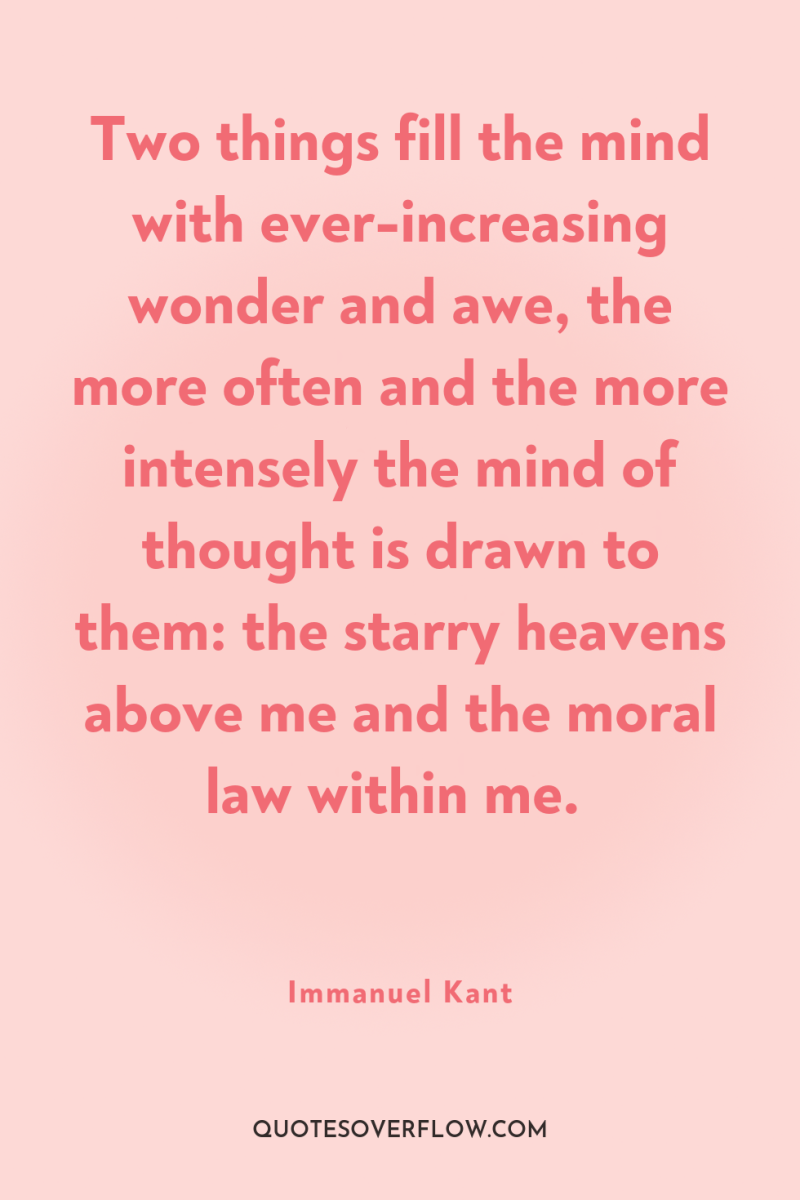
2
Two things fill the mind with ever-increasing wonder and awe, the more often and the more intensely the mind of thought is drawn to them: the starry heavens above me and the moral law within me.Immanuel Kant
3
Enlightenment is man's release from his self-incurred tutelage. Tutelage is man's inability to make use of his understanding without direction from another. Self-incurred is this tutelage when its cause lies not in lack of reason but in lack of resolution and courage to use it without direction from another. Sapere aude! 'Have courage to use your own reason! '- that is the motto of enlightenment. .Immanuel Kant
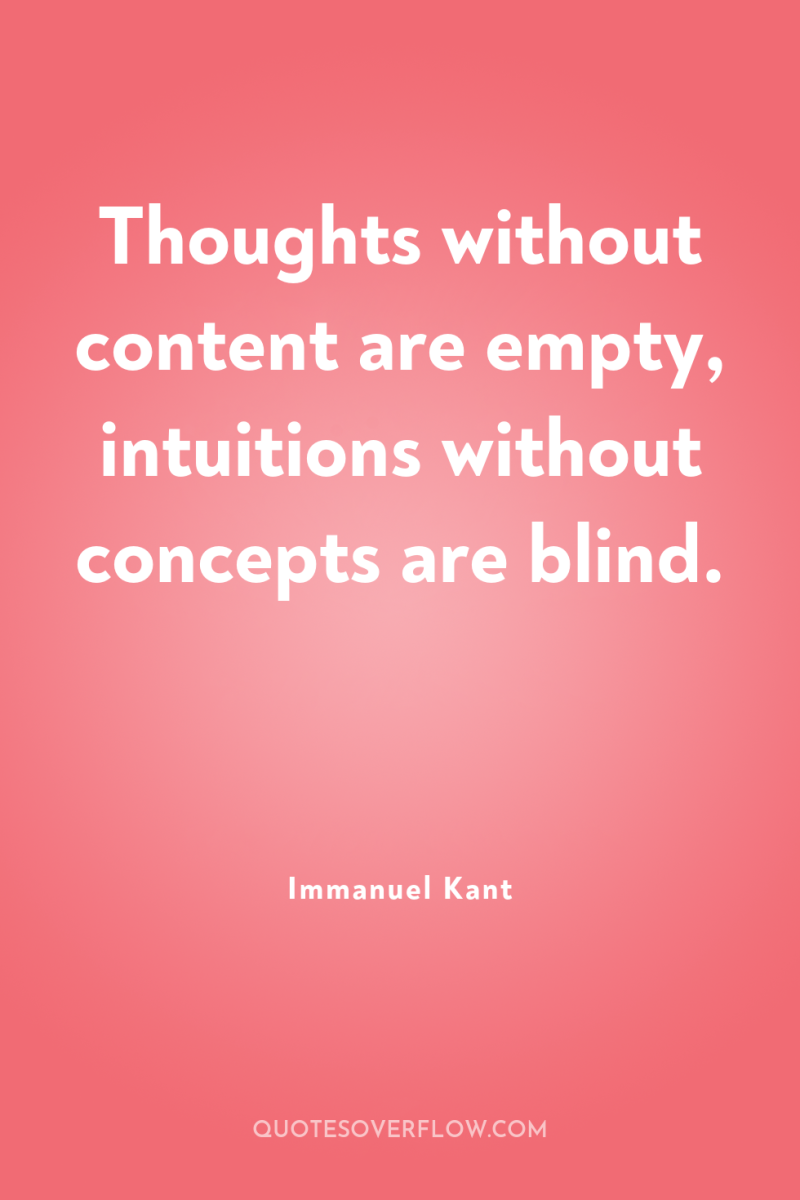
4
Thoughts without content are empty, intuitions without concepts are blind.Immanuel Kant
5
An age cannot bind itself and ordain to put the succeeding one into such a condition that it cannot extend its (at best very occasional) knowledge , purify itself of errors, and progress in general enlightenment. That would be a crime against human nature, the proper destination of which lies precisely in this progress and the descendants would be fully justified in rejecting those decrees as having been made in an unwarranted and malicious manner.Immanuel Kant
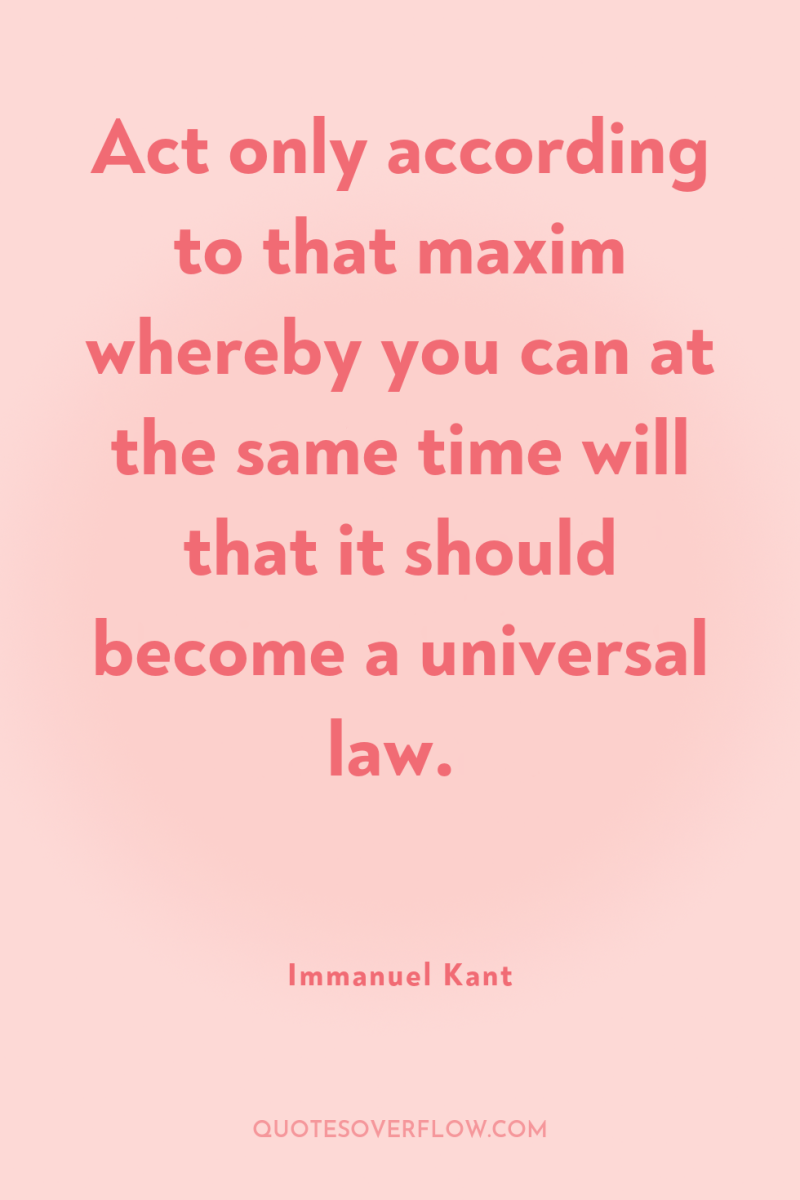
6
Act only according to that maxim whereby you can at the same time will that it should become a universal law.Immanuel Kant
7
Skepticism is thus a resting-place for human reason, where it can reflect upon its dogmatic wanderings and make survey of the region in which it finds itself, so that for the future it may be able to choose its path with more certainty. But it is no dwelling-place for permanent settlement. Such can be obtained only through perfect certainty in our knowledge, alike of the objects themselves and of the limits within which all our knowledge of objects is enclosed.Immanuel Kant
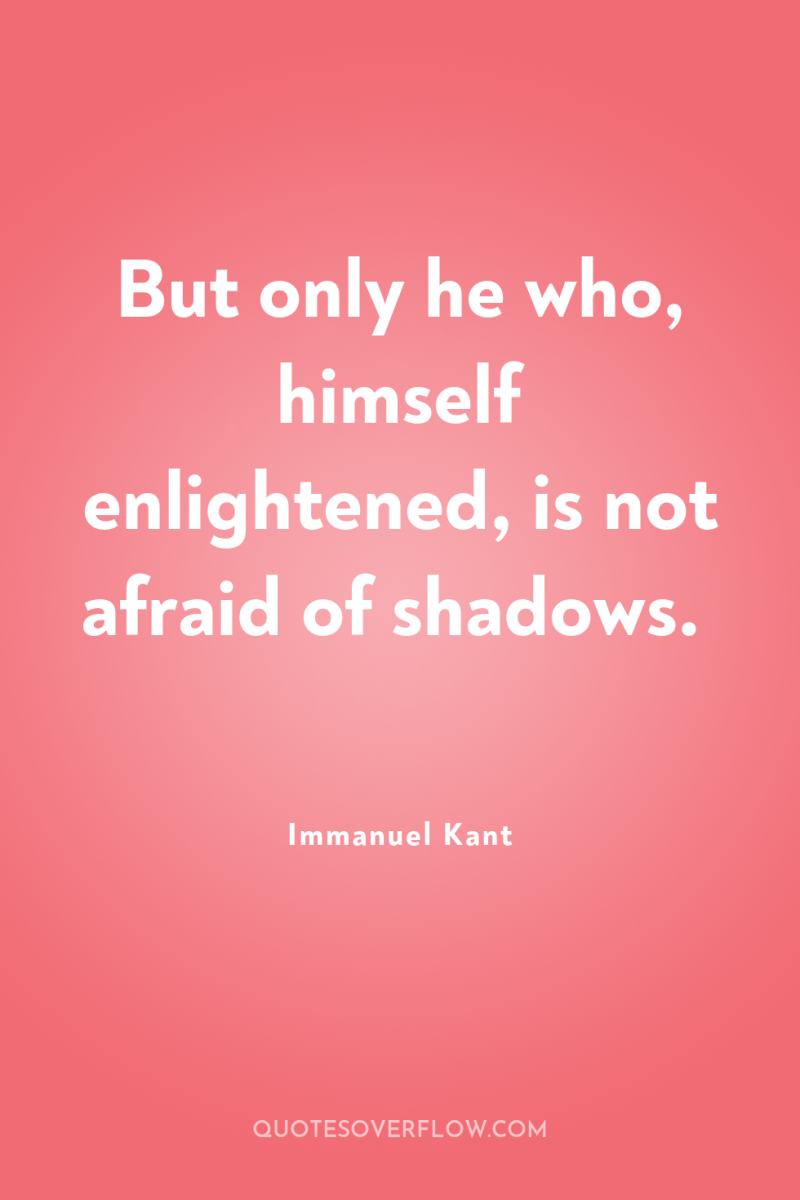
8
But only he who, himself enlightened, is not afraid of shadows.Immanuel Kant
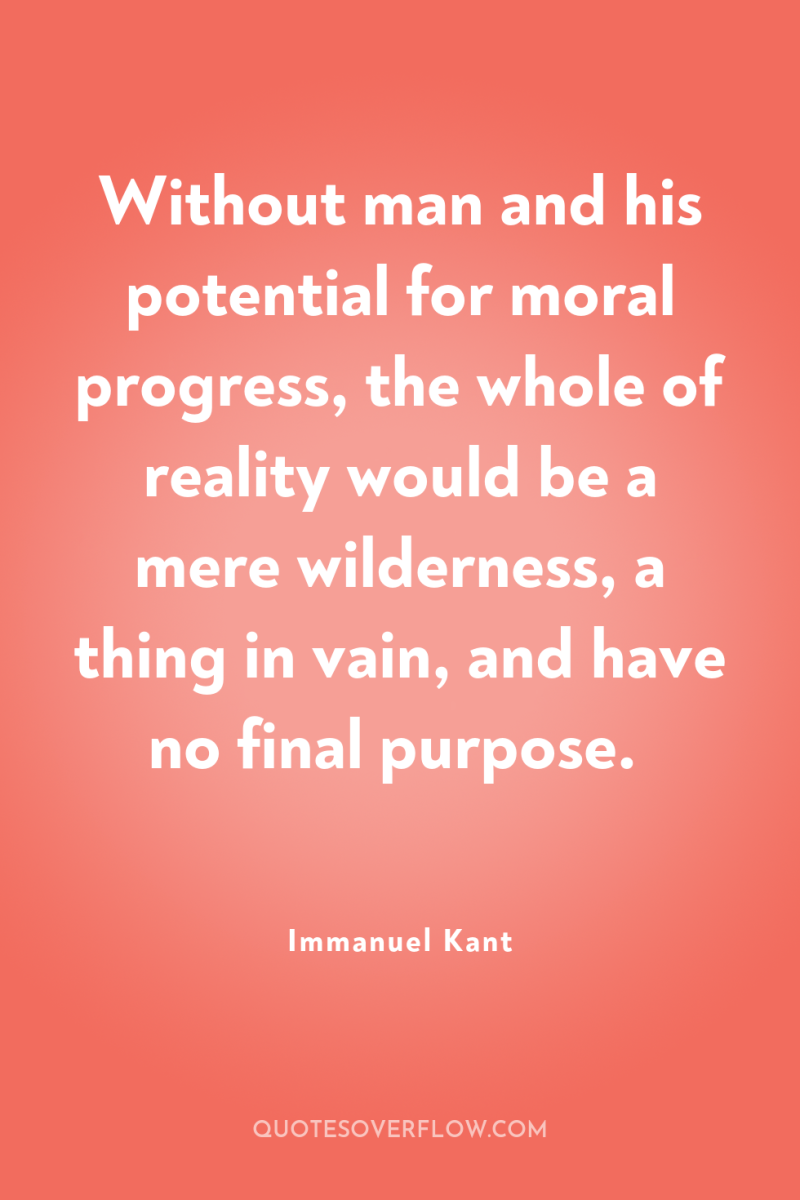
9
Without man and his potential for moral progress, the whole of reality would be a mere wilderness, a thing in vain, and have no final purpose.Immanuel Kant
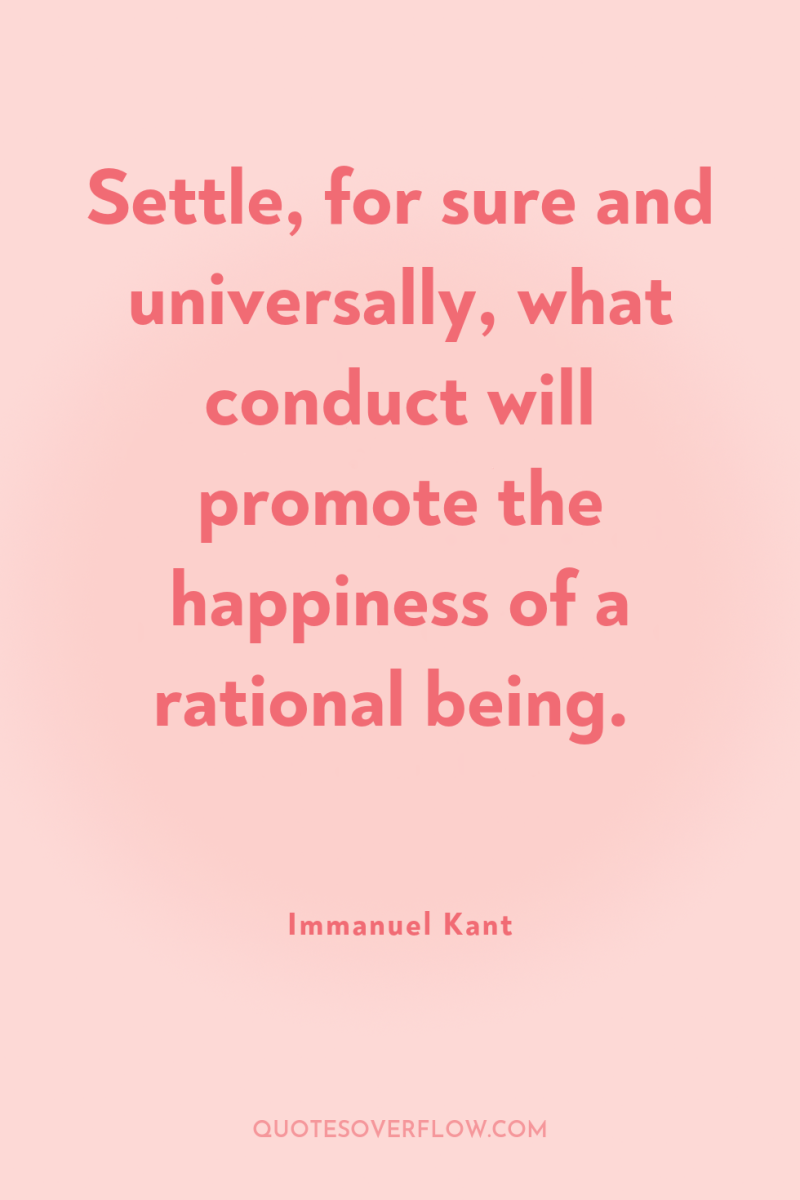
10
Settle, for sure and universally, what conduct will promote the happiness of a rational being.Immanuel Kant
11
Our critique is not opposed to the *dogmatic procedure* of reason in its pure knowledge as science (for science must always be dogmatic, that is, derive its proof from secure *a priori* principles), but only to *dogmatism*, that is, to the presumption that it is possible to make any progress with pure (philosophical) knowledge from concepts according to principles, such as reason has long been in the habit of using, without first inquiring in what way, and by what right, it has come to posses them. Dogmatism is therefore the dogmatic procedure of pure reason, *without a preceding critique of its own powers*; and our opposition to this is not intended to defend that loquacious shallowness which arrogates to itself the name of popularity, much less that skepticism which makes short work of the whole of metaphysics. On the contrary, our critique is meant to form a necessary preparation in support of metaphysics as a thorough science, which must necessarily be carried out dogmatically and strictly systematically, so as to satisfy all the demands, no so much of the public at large, as of the Schools. This is an indispensable demand for it has undertaken to carry out its work entirely *a priori*, and thus to carry it out to the complete satisfaction of speculative reason. In the execution of this plan, as traced out by the critique, that is, in a future system of metaphysics, we shall have to follow the strict method of the celebrated Wolff, the greatest of all dogmatic philosophers. He was the first to give an example (and by his example initiated, in Germany, that spirit of thoroughness which is not yet extinct) of how the secure course of a science could be attained only through the lawful establishment of principles, the clear determination of concepts, the attempt at strictness of proof and avoidance of taking bold leaps in our inferences. He was therefore most eminently qualified to give metaphysics the dignity of a science, if it had only occurred to him to prepare his field in advance by criticism of the organ, that is, of pure reason itself―an omission due not so much to himself as to the dogmatic mentality of his age, about which the philosophers of his own, as well as of all previous times, have no right to reproach one another. Those who reject both the method of Wolff and the procedure of the critique of pure reason can have no other aim but to shake off the fetters of *science* altogether, and thus to change work into play, certainty into opinion and philosophy into philodoxy." ―from_Critique of Pure Reason_. Preface to the Second Edition. Translated, edited, and with an Introduction by Marcus Weigelt, based on the translation by Max Müller, pp. 28-29 .Immanuel Kant
12
By this freedom the will of a rational being, as belonging to the sensuous world, recognizes itself to be, like all other efficient causes, necessarily subject to the laws of causality, while in practical matters, in its other aspect as a being in itself, it is conscious of its existence as determinable in an intelligible order of things. It is conscious of this not by virtue of a particular intuition of itself but because of certain dynamic laws which determine its causality in the world of sense, for it has been sufficiently proved in another place that if freedom is attributed to us, it transfers us into an intelligible order of things."―from_ Critique of Practical Reason_. Translated, with an Introduction by Lewis White Beck, p. 43. .Immanuel Kant
13
On the other hand, the moral law, although it gives no such prospect, does provide a fact absolutely inexplicable from any data of the world of sense or from the whole compass of the theoretical use of reason, and this fact points to a pure intelligible world―indeed, it defines it positively and enable us to know something of it, namely a law. This law gives to the sensible world, as sensuous nature (as this concerns rational beings), the form of an intelligible world, i.e., the form of supersensuous nature, without interfering with the mechanism of the former. Nature, in the widest sense of the word, is the existence of things under laws. The sensuous nature of rational beings in general is their existence under empirically conditioned laws, and therefore it is, from the point of view of reason, heteronomy. The supersensuous nature of the same beings, on the other hand, is their existence according to laws which are independent of all empirical conditions and which therefore belong to the autonomy of pure reason. And since the laws, according to which the existence of things depends on cognition, are practical, supersensuous nature, so far as we can form a concept of it, is nothing else than nature under the autonomy of the pure practical reason. The law of this autonomy is the moral law, and it, therefore, is the fundamental law of supersensuous nature and of a pure world of the understanding, whose counterpart must exist in the world of sense without interfering with the laws of the latter. The former could be called the archetypal world (*natura archetypa*) which we know only by reason; the latter, on the other hand, could be called the ectypal world (*natura ectypa*), because it contains the possible effect of the idea of the former as the determining ground of the will."―from_ Critique of Practical Reason_. Translated, with an Introduction by Lewis White Beck, p. 44. .Immanuel Kant
14
Metaphysics, a completely isolated and speculative branch of rational knowledge which is raised above all teachings of experience and rests on concepts only (not, like mathematics, on their application to intuition), in which reason therefore is meant to be its own pupil, has hitherto not had the good fortune to enter upon the secure path of a science, although it is older than all other sciences, and would survive even if all the rest were swallowed up in the abyss of an all-destroying barbarism. Reason in metaphysics, even if it tries, as it professes, only to gain *a priori* insight into those laws which are confirmed by our most common experience, is constantly being brought to a standstill, and we are obliged again and again to retrace our steps, as they do not lead us where we want to go. As to unanimity among its participants, there is so little of it in metaphysics that it has rather become an arena that would seem especially suited for those who wish to exercise themselves in mock fights, where no combatant has as yet succeeded in gaining even an inch of ground that he could call his permanent possession. There cannot be any doubt, therefore, that the method of metaphysics has hitherto consisted in a mere random groping, and, what is worst of all, in groping among mere concepts. What, then, is the reason that this secure scientific course has not yet been found? Is this, perhaps, impossible? Why, in that case, should nature have afflicted our reason with the restless aspiration to look for it, and have made it one of its most important concerns? What is more, how little should we be justified in trusting our reason, with regard to one of the most important objects of which we desire knowledge, it not only abandons us, but lures us on by delusions, and in the end betrays us! Or, if hitherto we have only failed to meet with the right path, what indications are there to make us hope that, should we renew our search, we shall be more successful than others before us?"―from_ Critique of Pure Reason_. Preface to the Second Edition. Translated, edited, and with an Introduction by Marcus Weigelt, based on the translation by Max Müller, p. 17 .Immanuel Kant
15
A similar experiment may be tried in metaphysics as regards the *intuition* of objects. If the intuition had to conform to the constitution of objects, I would not understand how we could know anything of them *a priori*; but if the object (as object of the senses) conformed to the constitution of our faculty of intuition, I could very well conceive such a possibility. As, however, I cannot rest in these intuitions if they are to become knowledge, but have to refer them as representations, to something as their object, and must determine this object through them, I can assume either that the *concepts* through which I arrive at this determination also conform to the object, and I would again be as perplexed about how I can know anything about it *a priori*; or else that the objects, or what is the same thing, the *experience* in which alone they are known (as objects that are given to us), conform to those concepts. In the latter case, I recognize an easier solution because experience itself is a kind of knowledge that requires understanding; and this understanding has its rules which I must presuppose as existing within me even before objects are given to me, and hence *a priori*. These rules are expressed in *a priori* concepts to which all objects of experience must necessarily conform, and with which they must agree. With regard to objects, insofar as they are thought merely through reason and thought indeed as necessary, and which can never, at least not in the way in which reason thinks them, be given in experience, the attempts at thinking them (for they must admit of being thought) will subsequently furnish an excellent touchstone of what we are adopting as our new method of thought, namely, that we know of things *a priori* only that which we ourselves put into them."―from_ Critique of Pure Reason_. Preface to the Second Edition. Translated, edited, and with an Introduction by Marcus Weigelt, based on the translation by Max Müller, pp. 18-19 .Immanuel Kant
16
This experiment succeeds as hoped and promises to metaphysics, in its first part, which deals with those *a priori* concepts to which the corresponding objects may be given in experience, the secure course of a science. For by thus changing our point of view, the possibility of *a priori* knowledge can well be explained, and, what is still more, the laws which *a priori* lie at the foundation of nature, as the sum total of the objects of experience, may be supplied with satisfactory proofs, neither of which was possible within the procedure hitherto adopted. But there arises from this deduction of our faculty of knowing *a priori*, as given in the first part of metaphysics, a somewhat startling result, apparently most detrimental to that purpose of metaphysics which has to be treated in its second part, namely the impossibly of using this faculty to transcend the limits of possible experience, which is precisely the most essential concern of the science of metaphysics. But here we have exactly the experiment which, by disproving the opposite, establishes the truth of the first estimate of our *a priori* rational knowledge, namely, that it is directed only at appearances and must leave the thing in itself as real for itself but unknown to us. For that which necessarily impels us to to go beyond the limits of experience and of all appearances is the *unconditioned*, which reason rightfully and necessarily demands, aside from everything conditioned, in all things in themselves, so that the series of conditions be completed. If, then, we find that, under the supposition that our empirical knowledge conforms to objects as things in themselves, the unconditioned *cannot be thought without contradiction*, while under the supposition that our representation of things as they are given to us does not conform to them as things in themselves, but, on the contrary, that these objects as appearance conform to our mode of representation, then *the contradiction vanishes*; and if we find, therefore, that the unconditioned cannot be encountered in things insofar as we are acquainted with them (insofar as they are given to us), but only in things insofar as we are not acquainted with them, that is, insofar as they are things in themselves; then it becomes apparent that what we at first assumed only for the sake of experiment is well founded. However, with speculative reason unable to make progress in the field of the supersensible, it is still open to us to investigate whether in reason's practical knowledge data may not be found which would enable us to determine that transcendent rational concept of the unconditioned, so as to allow us, in accordance with the wish of metaphysics, to get beyond the limits of all possible experience with our *a priori* knowledge, which is possible in practical matters only. Within such a procedure, speculative reason has always at least created a space for such an expansion, even if it has to leave it empty; none the less we are at liberty, indeed we are summoned, to fill it, if we are able to do so, with practical *data* of reason."―from_ Critique of Pure Reason_. Preface to the Second Edition. Translated, edited, and with an Introduction by Marcus Weigelt, based on the translation by Max Müller, pp. 19-21 .Immanuel Kant
17
The purpose of this critique of pure speculative reason consists in the attempt to change the old procedure of metaphysics, and to bring about a complete revolution after the example set by geometers and investigators of nature. This critique is a treatise on the method, not a system of the science itself; but nevertheless it marks out the whole plan of this science, both with regard to its limits and with regard to its inner organization. For it is peculiar to pure speculative reason that it is able, indeed bound, to measure its own powers according to the different ways in which it chooses its objects for thought, and to enumerate exhaustively the different ways of choosing its problems, thus tracing a complete outline of a system of metaphysics. This is due to the fact that, with regard to the first point, nothing can be attributed to objects in *a priori* knowledge, except what the thinking subject takes from within itself; while, with regard to the second point, pure reason, as far as its principles of knowledge are concerned, forms a separate and independent unity, in which, as in an organized body, every member exists for the sake of all the others, and all the others exist for the sake of the one, so that no principle can be safely applied in *one* relation unless it has been carefully examined in *all* its relations to the whole use of pure reason. Hence, too, metaphysics has this singular advantage, an advantage which cannot be shared by any other rational science which has to deal with objects (for *logic* deals only with the form of thought in general), that if by means of this critique it has been set upon the secure course of a science, it can exhaustively grasp the entire field of knowledge pertaining to it, and can thus finish its work and leave it to posterity as a capital that can never be added to, because it has to deal only with principles and with the limitations of their use, as determined by these principles themselves. And this completeness becomes indeed an obligation if metaphysics is to be a fundamental science, of which we must be able to say, *nil actum reputants, si quid superesset agendum* [to think that nothing was done for as long as something remained to be done]." ―from_Critique of Pure Reason_. Preface to the Second Edition. Translated, edited, and with an Introduction by Marcus Weigelt, based on the translation by Max Müller, pp. 21-22 .Immanuel Kant
18
We have seen, therefore, that I am not allowed even to *assume*, for the sake of the necessary practical use of my reason *God, freedom, immortality*, unless at the same time *I deprive* speculative reason of its pretensions to transcendent insights. Reason, namely, in order to arrive at these, must employ principles which extend only to objects of possible experience, and which, if in spite of this they are applied also to what cannot be an object of experience, actually always change this into an appearance, thus rendering all practical *expansion* of pure reason impossible. Hence I had to suspend *knowledge* in order to make room for *belief*. For the dogmatism of metaphysics without a preceding critique of pure reason, is the source of all that disbelief which opposes morality and which is always very dogmatic." ―from_Critique of Pure Reason_. Preface to the Second Edition. Translated, edited, and with an Introduction by Marcus Weigelt, based on the translation by Max Müller, pp. 25-26.Immanuel Kant
19
Finer feeling, which we now wish to consider, is chiefly of two kinds: the feeling of the *sublime* and that of the *beautiful*. The stirring of each is pleasant, but in different ways. The sight of a mountain whose snow-covered peak rises above the clouds, the description of a raging storm, or Milton's portrayal of the infernal kingdom, arouse enjoyment but with horror; on the other hand, the sight of flower strewn meadows, valleys with winding brooks and covered with grazing flocks, the description of Elysium, or Homer's portrayal of the girdle of Venus, also occasion a pleasant sensation but one that is joyous and smiling. In order that the former impression could occur to us in due strength, we must have *a feeling of the sublime*, and, in order to enjoy the latter well, *a feeling of the beautiful*. Tall oaks and lonely shadows in a sacred grove are sublime; flower beds, low hedges and trees trimmed in figures are beautiful. Night is sublime; day is beautiful. Temperaments that possess a feeling for the sublime are drawn gradually, by the quiet stillness of a summer evening as the shimmering light of the stars breaks through the brown shadows of night and the lonely moon rises into view, into high feelings of friendship, of disdain for the world, of eternity. The shining day stimulates busy fervor and a feeling of gaiety. The sublime *moves*, the beautiful *charms*.Immanuel Kant
20
It will be seen how there can be the idea of a special science, the *critique of pure reason* as it may be called. For reason is the faculty which supplies the *principles* of *a priori* knowledge. Pure reason therefore is that which contains the principles of knowing something entirely *a priori*. An *organon* of pure reason would be the sum total of the principles by which all pure *a priori* knowledge can be acquired and actually established. Exhaustive application of such an organon would give us a system of pure reason. But as this would be a difficult task, and as at present it is still doubtful whether indeed an expansion of our knowledge is possible here at all, we may regard a science that merely judges pure reason, its sources and limits, as the *propaedeutic* to the system of pure reason. In general, it would have to be called only a *critique*, not a *doctrine* of pure reason. Its utility, in regard to speculation, would only be negative, for it would serve only to purge rather than to expand our reason, and, which after all is a considerable gain, would guard reason against errors. I call all knowledge *transcendental* which deals not so much with objects as with our manner of knowing objects insofar as this manner is to be possible *a priori*. A system of such concepts would be called *transcendental philosophy*. But this is still, as a beginning, too great an undertaking. For since such a science must contain completely both analytic and synthetic *a priori* knowledge, it is, as far as our present purpose is concerned, much too comprehensive. We will be satisfied to carry the analysis only so far as is indispensably necessary in order to understand in their whole range the principles of *a priori* synthesis, with which alone we are concerned. This investigation, which properly speaking should be called only a transcendental critique but not a doctrine, is all we are dealing with at present. It is not meant to expand our knowledge but only to correct it, and to become the touchstone of the value, or lack of value, of all *a priori* knowledge. Such a critique is therefore the preparation, as far as possible, for a new organon, or, if this should turn out not to be possible, for a canon at least, according to which, thereafter, the complete system of a philosophy of pure reason, whether it serve as an expansion or merely as a limitation of its knowledge, may be carried out both analytically and synthetically. That such a system is possible, indeed that it need not be so comprehensive as to cut us off from the hope of completing it, may already be gathered from the fact that it would have to deal not with the nature of things, which is inexhaustible, but with the understanding which makes judgments about the nature of things, and with this understanding again only as far as its *a priori* knowledge is concerned. The supply of this *a priori* knowledge cannot be hidden from us, as we need not look for it outside the understanding, and we may suppose this supply to prove sufficiently small for us to record completely, judge as to its value or lack of value and appraise correctly. Still less ought we to expect here a critique of books and systems of pure reason, but only the critique of the faculty of pure reason itself. Only once we are in possession of this critique do we have a reliable touchstone for estimating the philosophical value of old and new works on this subject. Otherwise, an unqualified historian and judge does nothing but pass judgments upon the groundless assertions of others by means of his own, which are equally groundless.Immanuel Kant
21
Our knowledge springs from two fundamental sources of our mind; the first is to receive representations (receptivity of impressions), the second is the faculty of knowing an object through these representations (spontaneity of concepts). Through the first an object is *given* to us, through the second the object is *thought* in relation to that representation (which is a mere determination of the mind). Intuition and concepts constitute, therefore, the elements of all our knowledge, so that neither concepts without an intuition in some way corresponding to them, nor intuition without concepts can yield knowledge. Both are either pure or empirical. They are empirical when they contain sensation (sensation presupposes the actual presence of the object). They are *pure* when no sensation is mixed in with the representation. Sensation may be called the matter of sensible knowledge. Pure intuition, therefore, contains only the form under which something is intuited, and the pure concepts contains only the form of thinking an object in general. Pure intuitions and pure concepts alone are possible *a priori*, empirical intuitions and empirical concepts only *a posteriori*. We call *sensibility* the *receptivity* of our mind to receive representations insofar as it is in some wise affected, while the *understanding*, on the other hand, is our faculty of producing representations by ourselves, or the *spontaneity* of knowledge. We are so constituted that our intuition can never be other than *sensible*; that is, it contains only the mode in which we are affected by objects. The faculty, on the contrary, which enables us to *think* the object of sensible intuition is the *understanding*. Neither of these properties is to be preferred to the other. Without sensibility no object would be given to us, without understanding no object would be thought. Thoughts without content are empty, intuitions without concepts are blind. It is, therefore, just as necessary to make our concepts sensible (i.e., to add the object to them in intuition) as to make our intuitions understandable (i.e., to bring them under concepts). These two faculties or capacities cannot exchange their functions. The understanding cannot intuit anything, the senses cannot think anything. Only from their union can knowledge arise. But this is no reason for confounding their respective contributions; rather, it gives us a strong reason for carefully separating and distinguishing the one from the other. We therefore distinguish the science of the rules of sensibility in general, i.e., aesthetic, from the science of the rules of the understanding in general, i.e., logic."― Transcendental Doctrine of Elements. Transcendental Logic: The Idea of a Transcendental Logic.Immanuel Kant
22
To know what questions may reasonably be asked is already a great and necessary proof of sagacity and insight. For if a question is absurd in itself and calls for unnecessary answers, it not only brings disgrace to the person raising it, but may prompt an incautious listener to give absurd answers, thus presenting, as the ancients said, the laughable spectacle of one person milking a he-goat, and another holding the sieve underneath.Immanuel Kant
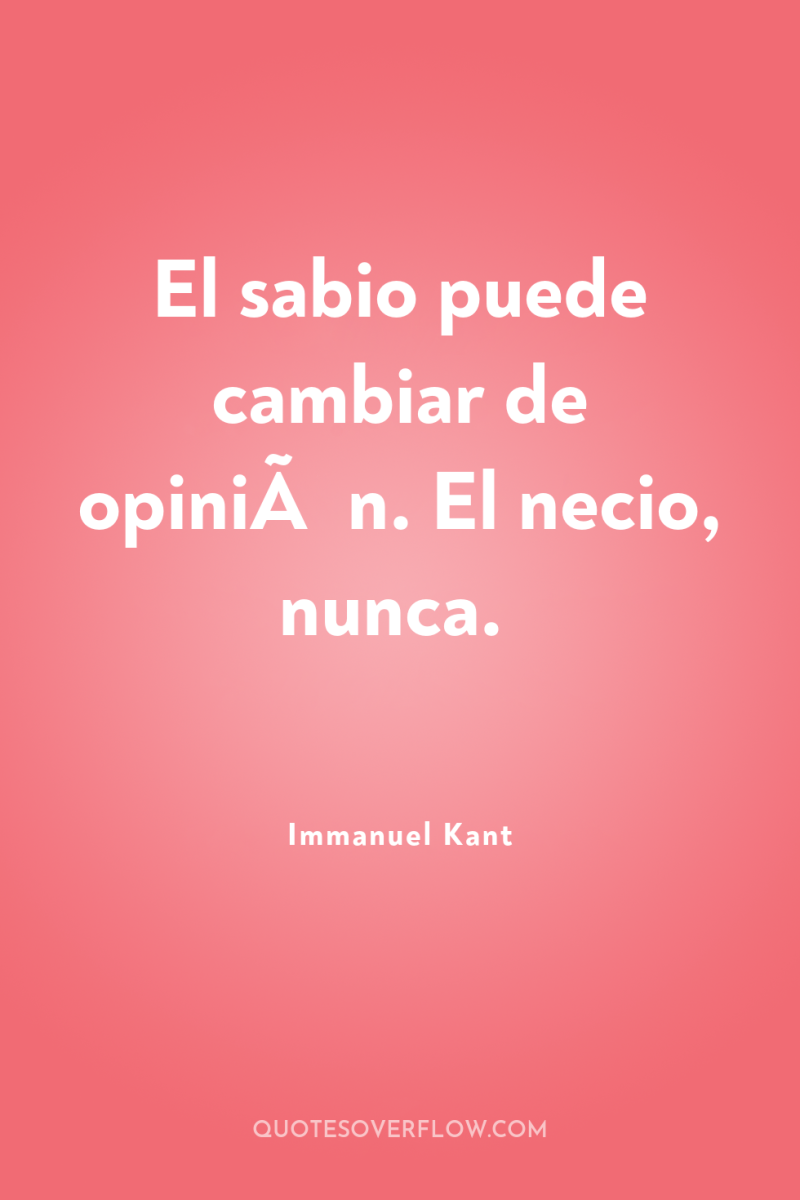
23
El sabio puede cambiar de opinión. El necio, nunca.Immanuel Kant
24
..[A]ll the elements which belong to the notion of happiness are altogether empirical, that is, they must be borrowed from experience, and nevertheless the idea of happiness requires an absolute whole, a maximum of welfare in my present and all future circumstances. Now it is impossible that the most clear-sighted and at the same time most powerful being (supposed finite) should frame to himself a definite conception of what he really wills in this. Does he will riches, how much anxiety, envy, and snares might he not thereby draw upon his shoulders? Does he will knowledge and discernment, perhaps it might prove to be only an eye so much the sharper to show him so much the more fearfully the evils that are now concealed from him and that cannot be avoided, or to impose more wants on his desires, which already give him concern enough. Would he have long life? Who guarantees to him that it would not be a long misery? Would he at least have health? How often has uneasiness of the body restrained from excesses into which perfect health would have allowed one to fall, and so on? In short, he is unable, on any principle, to determine with certainty what would make him truly happy; because to do so he would need to be omniscient. .Immanuel Kant
25
The sight of a being who is not adorned with a single feature of a pure and good will, enjoying unbroken prosperity, can never give pleasure to an impartial rational spectator. Thus a good will appears to constitute the indispensable condition even of being worthy of happiness.Immanuel Kant
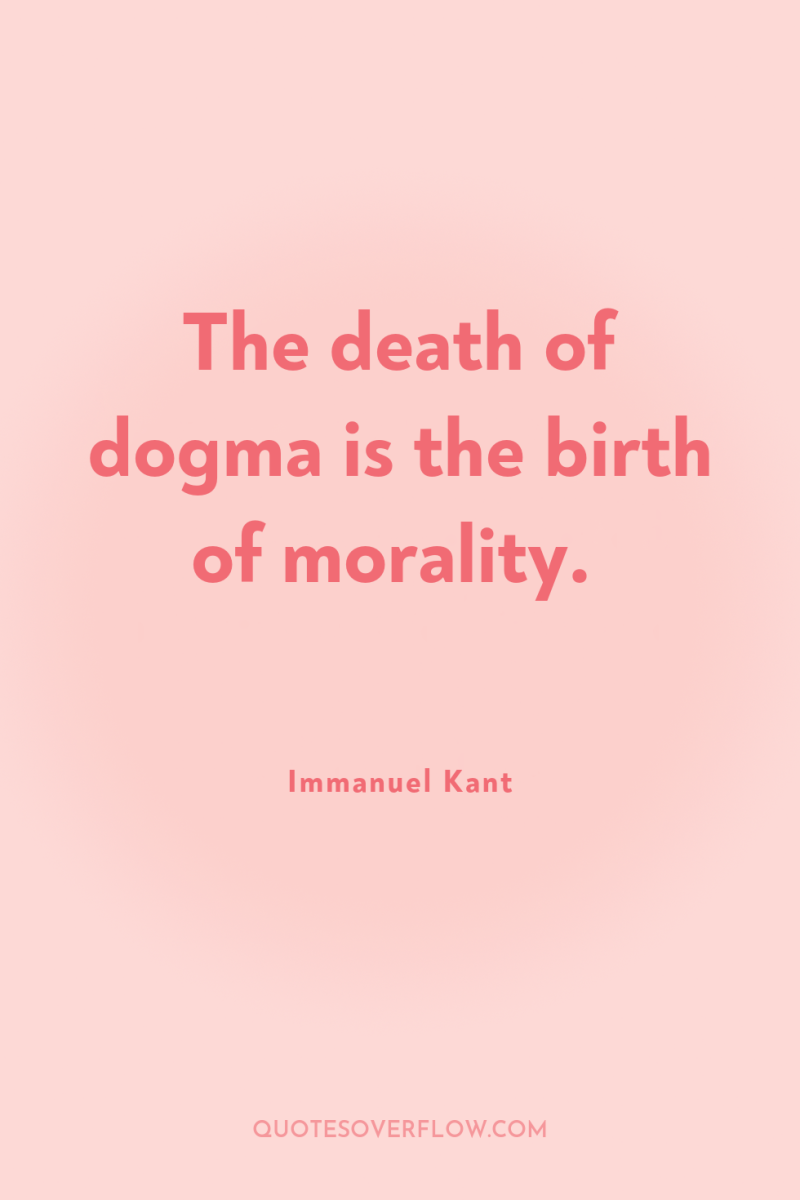
26
The death of dogma is the birth of morality.Immanuel Kant

27
I had to deny knowledge in order to make room for faith.Immanuel Kant
28
..We find that the more a cultivated reason applies itself with deliberate purpose to the enjoyment of life and happiness, so much the more does the man fail of true satisfaction.. even from the sciences.. they find that they have, in fact, only brought more trouble on their shoulders rather than gained in happiness; and they end by envying rather than despising the more common stamp of men who keep closer to the guidance of mere instinct, and do not allow their reason much influence on their conduct.. [T]here lies at the root of these judgments the idea that our existence has a different and far nobler end, for which, and not for happiness, reason is properly intended.. .Immanuel Kant
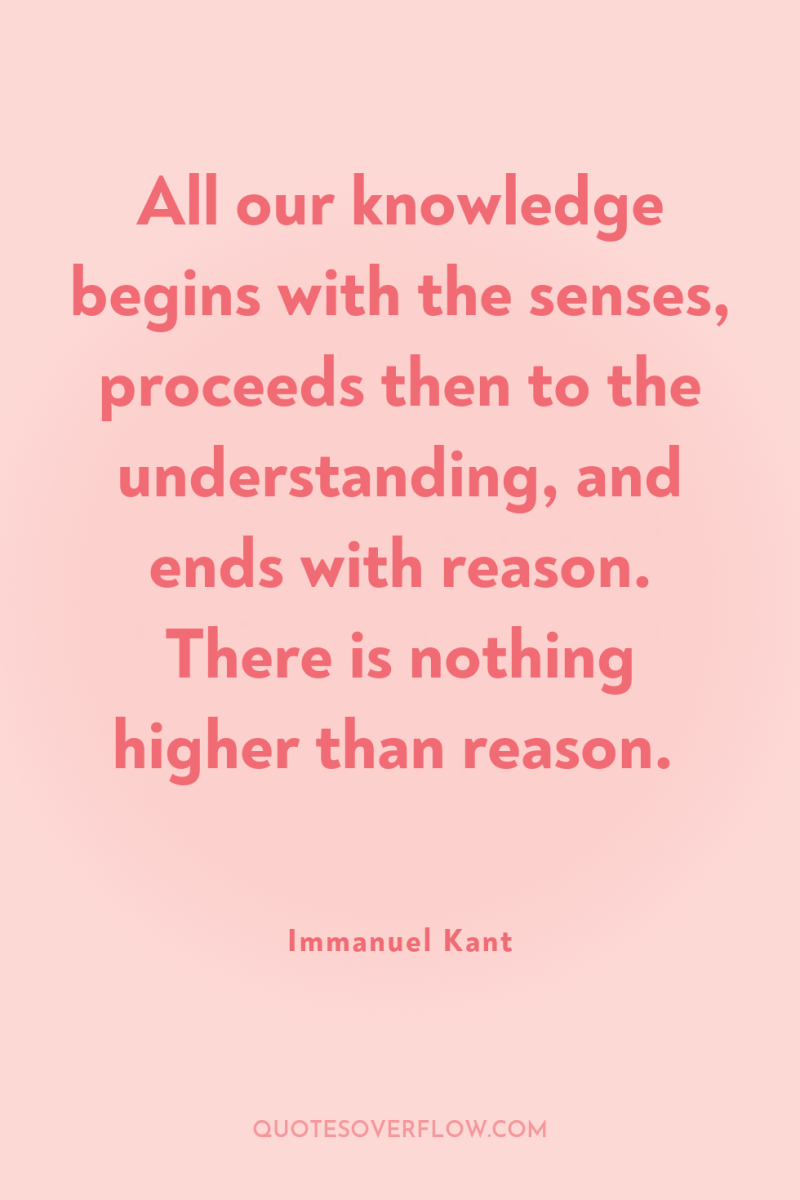
29
All our knowledge begins with the senses, proceeds then to the understanding, and ends with reason. There is nothing higher than reason.Immanuel Kant
30
...[M]oral instruction, although containing much that is convincing for the reason, ...accomplishes... little... [because] the teachers themselves have not got their own notions clear, and when they endeavor to make up for this by raking up motives of moral goodness from every quarter, trying to make their physic right strong, they spoil it.Immanuel Kant

31
He who would know the world must first manufacture it.Immanuel Kant
32
That all our knowledge begins with experience there can be no doubt. For how should the faculty of knowledge be called into activity, if not by objects which affect our senses and which, on the one hand, produce representations by themselves or on the other, rouse the activity of our understanding to compare, connect, or separate them and thus to convert the raw material of our sensible impressions into knowledge of objects, which we call experience? With respect to time, therefore, no knowledge within us is antecedent to experience, but all knowledge begins with it. But though all our knowledge begins with experience, is does not follow that it all arises from experience. For it is quite possible that even our empirical knowledge is a compound of that which we perceive through impressions, and of that which our own faculty of knowledge (incited by sense impressions) supplies from itself, a supplement which we do not distinguish from that raw material until long practice and rendered us capable of separating one from the other. It is therefore a question which deserves at least closer investigation and cannot be disposed of at first sight: Whether there is any knowledge independent of all experience and even of all impressions of the senses? Such knowledge is called 'a priori' and is distinguished from empirical knowledge, which has its source 'a posteriori', that is, in experience..Immanuel Kant
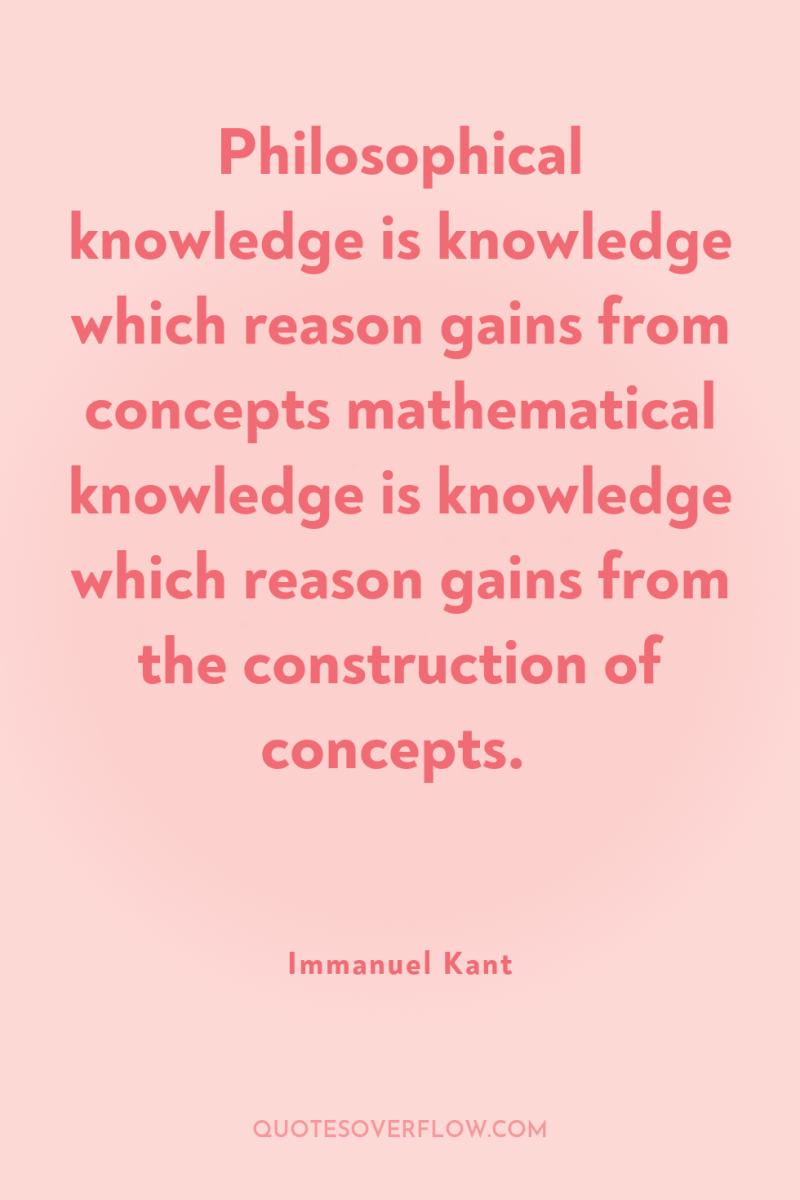
33
Philosophical knowledge is knowledge which reason gains from concepts mathematical knowledge is knowledge which reason gains from the construction of concepts.Immanuel Kant
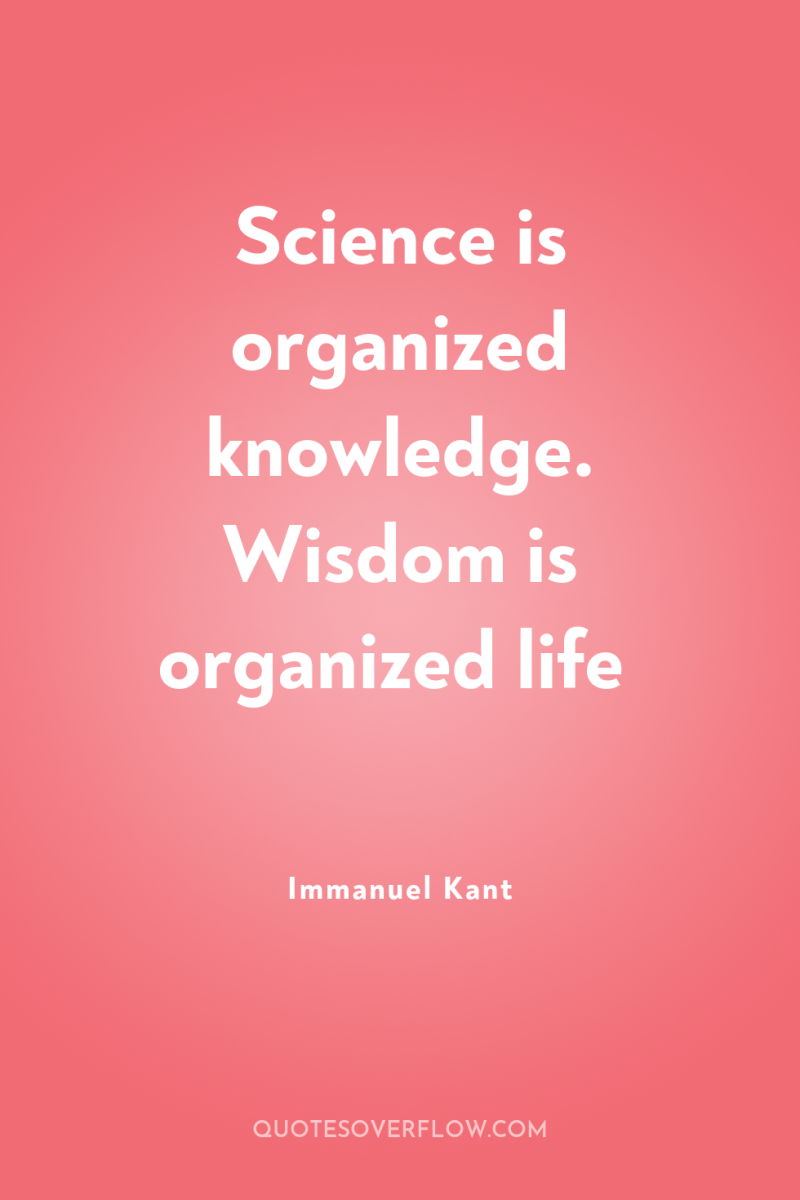
34
Science is organized knowledge. Wisdom is organized lifeImmanuel Kant
![...[H]uman reason in its pure use, so long as it...](https://cdn.quotesoverflow.com/file/quotesoverflow/images/human-reason-in-its-pure-use379478594623-1200.webp)
35
...[H]uman reason in its pure use, so long as it was not critically examined, has first tried all possible wrong ways before it succeeded in finding the one true way.Immanuel Kant
36
Since in early youth it cannot be known what ends are likely to occur to us in the course of life, parents seek to have their children taught a great many things, and provide for their skill in the use of means for all sorts of arbitrary ends, of none of which can they determine whether it may not perhaps hereafter be an object to determine their pupil, but which it is at all events possible that he might aim at; and this anxiety is so great that they commonly neglect to form and correct their judgement on the value of the things which may be chosen as ends.Immanuel Kant
37
If I have a book that thinks for me, a pastor who acts as my conscience, a physician who prescribes my diet, and so on... then I have no need to exert myself. I have no need to think, if only I can pay; others will take care of that disagreeable business for me.Immanuel Kant
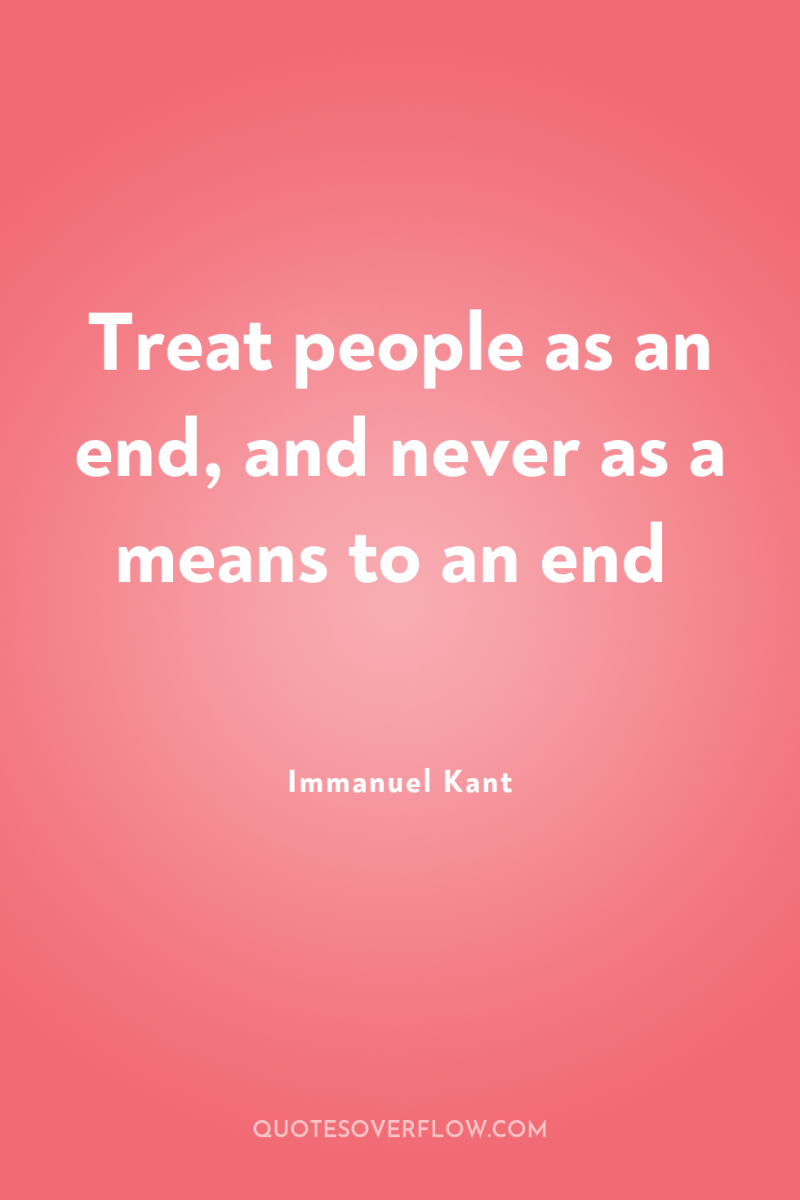
38
Treat people as an end, and never as a means to an endImmanuel Kant
39
Two things fill the mind with ever new and increasing admiration and awe, the more often and steadily we reflect upon them: the starry heavens above me and the moral law within me. I do not seek or conjecture either of them as if they were veiled obscurities or extravagances beyond the horizon of my vision; I see them before me and connect them immediately with the consciousness of my existence.Immanuel Kant
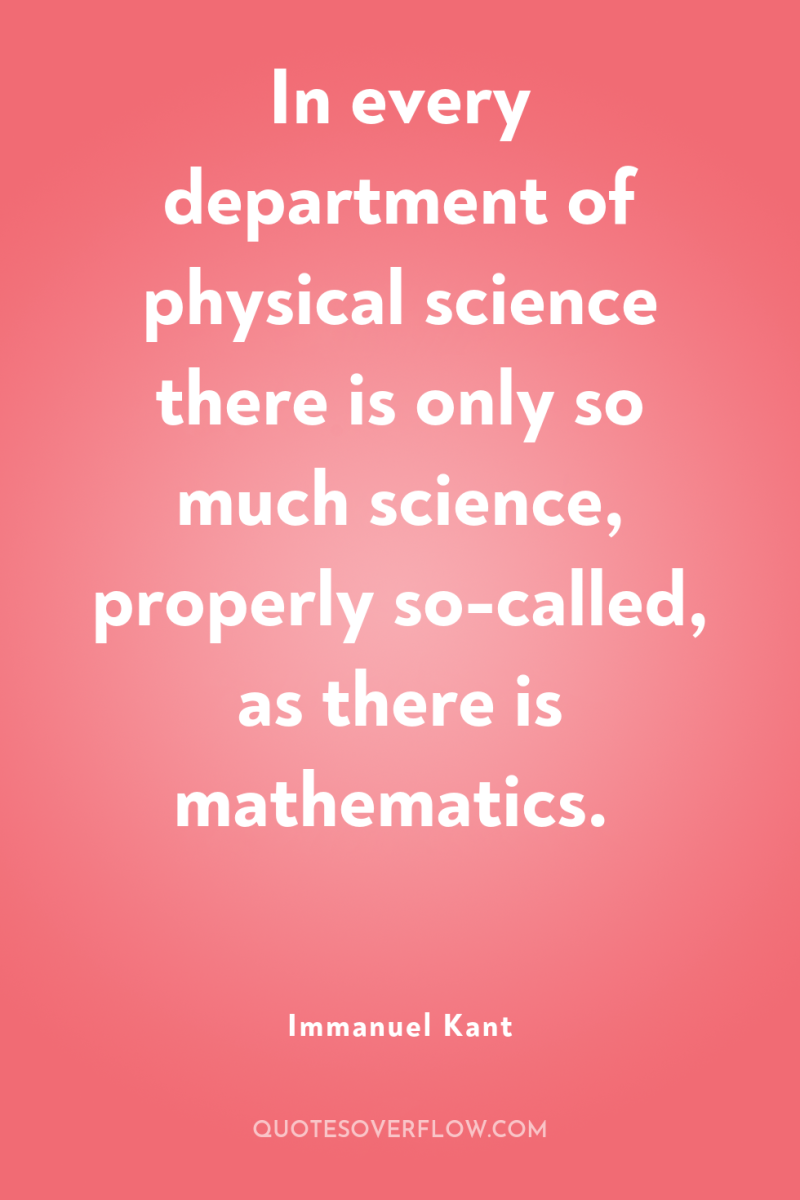
40
In every department of physical science there is only so much science, properly so-called, as there is mathematics.Immanuel Kant
![...[P]hysics... [is] the philosophy of nature, so far as it...](https://cdn.quotesoverflow.com/file/quotesoverflow/images/physics-is-the-philosophy-of-nature363411545623-1200.webp)
41
...[P]hysics... [is] the philosophy of nature, so far as it is based on empirical laws.Immanuel Kant
42
Here then we see philosophy brought to a critical position, since it has to be firmly fixed, notwithstanding that it has nothing to support it in heaven or earth. Here it must show its purity as absolute director of its own laws, not the herald of those which are whispered to it by an implanted sense or who knows what tutelary nature. Although these may be better than nothing, yet they can never afford principles dictated by reason, which must have their source wholly a priori and thence their commanding authority, expecting everything from the supremacy of the the law and due respect for it, nothing from inclination, or else condemning the man to self-contempt and inward abhorrence.Immanuel Kant
43
..[R]eason of itself, independent on all experience, ordains what ought to take place, that accordingly actions of which perhaps the world has hitherto never given an example, the feasibility even if which might be very much doubted by one who founds everything on experience, are nevertheless inflexibly commanded by reason; that, for example, even though there might never yet have been a sincere friend, yet not a whit the less is pure sincerity in friendship required of every man..Immanuel Kant
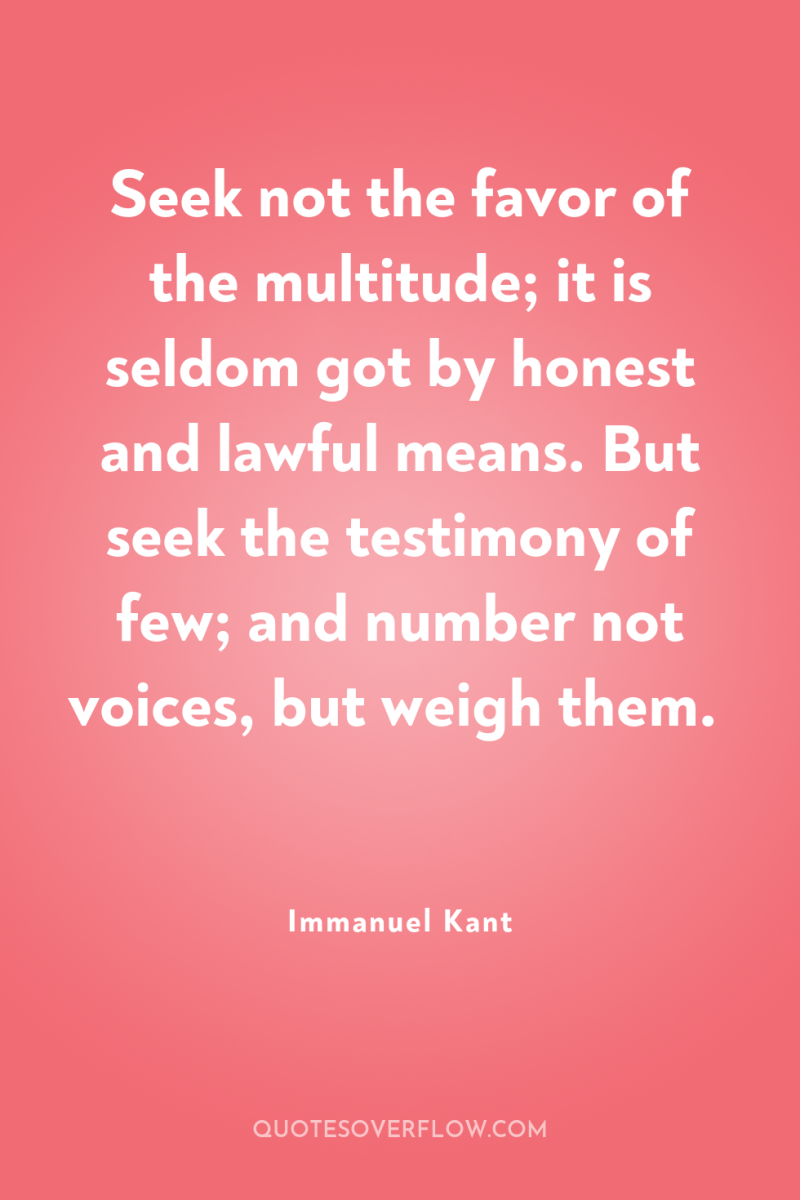
44
Seek not the favor of the multitude; it is seldom got by honest and lawful means. But seek the testimony of few; and number not voices, but weigh them.Immanuel Kant
45
..new prejudices will serve as well as old ones to harness the great unthinking masses. For this enlightenment, however, nothing is required but freedom, and indeed the most harmless among all the things to which this term can properly be applied. It is the freedom to make public use of one's reason at every point. But I hear on all sides, 'Do not argue! ' The Officer says: 'Do not argue but drill! ' The tax collector: 'Do not argue but pay! ' The cleric: 'Do not argue but believe! ' Only one prince in the world says, 'Argue as much as you will, and about what you will, but obey! ' Everywhere there is restriction on freedom. .Immanuel Kant
46
As nature has uncovered from under this hard shell the seed for which she most tenderly cares - the propensity and vocation to free thinking - this gradually works back upon the character of the people, who thereby gradually become capable of managing freedom; finally, it affects the principles of government, which finds it to its advantage to treat men, who are now more than machines, in accordance with their dignity.Immanuel Kant
![...[F]reedom... is a property of all rational beings.](https://cdn.quotesoverflow.com/file/quotesoverflow/images/freedom-is-a-property-of-all349497537686-1200.webp)
47
...[F]reedom... is a property of all rational beings.Immanuel Kant
48
It must be freely admitted that there is a sort of circle here from which it seems impossible to escape. In the order of efficient causes we assume ourselves free, in order that in the order of ends we may conceive ourselves as subject to these laws because we have attributed to ourselves freedom of will; for freedom and self-legislation of will are both autonomy...Immanuel Kant
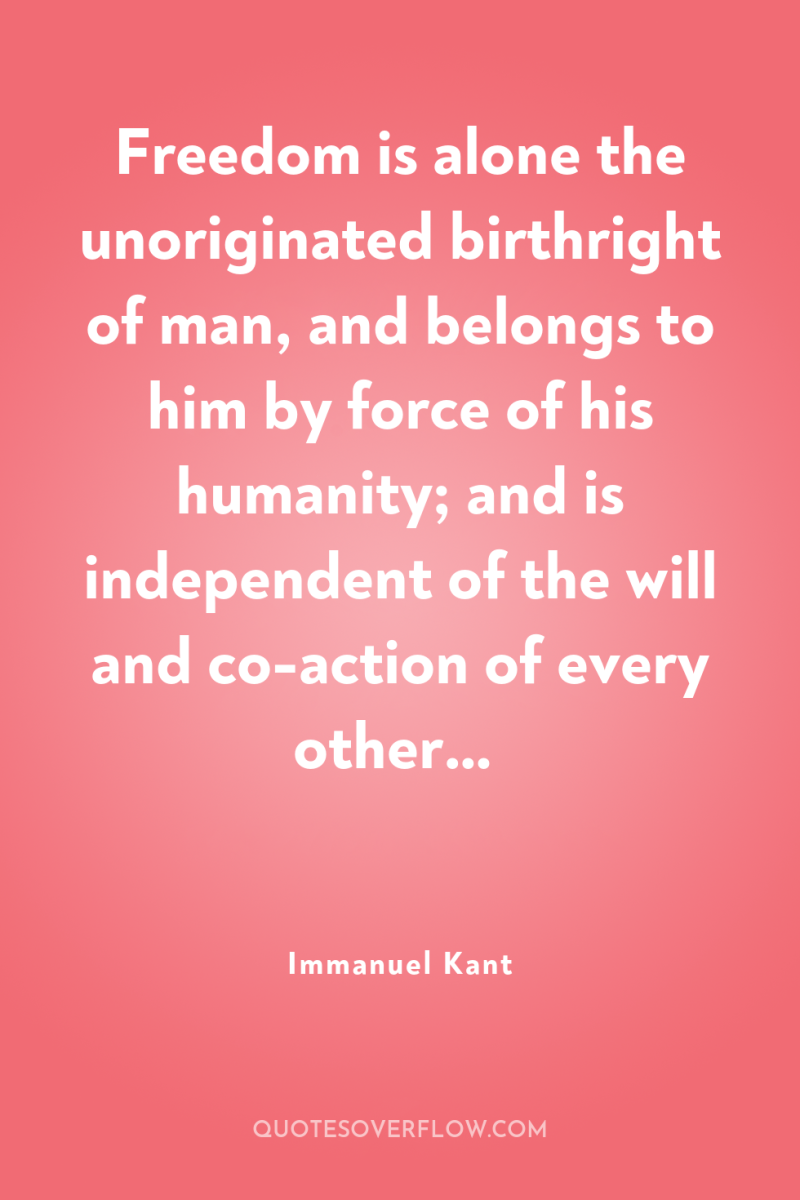
49
Freedom is alone the unoriginated birthright of man, and belongs to him by force of his humanity; and is independent of the will and co-action of every other…Immanuel Kant
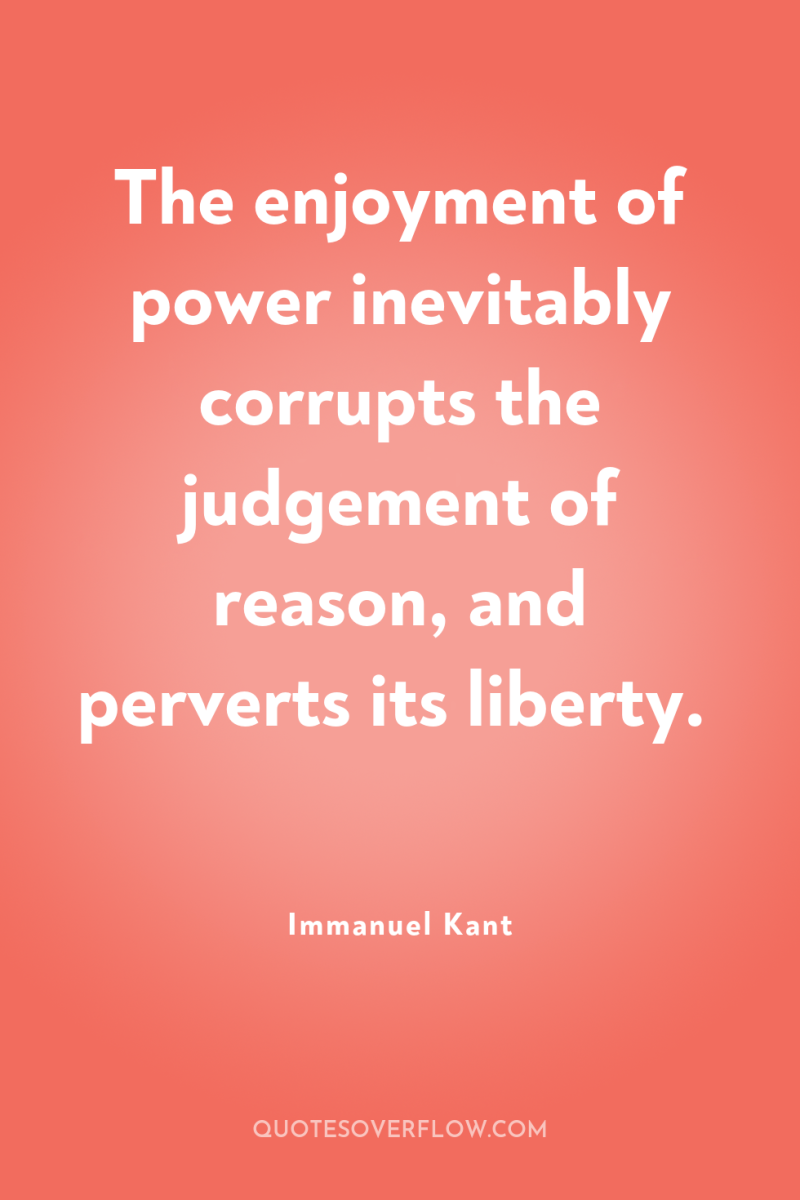
50
The enjoyment of power inevitably corrupts the judgement of reason, and perverts its liberty.Immanuel Kant
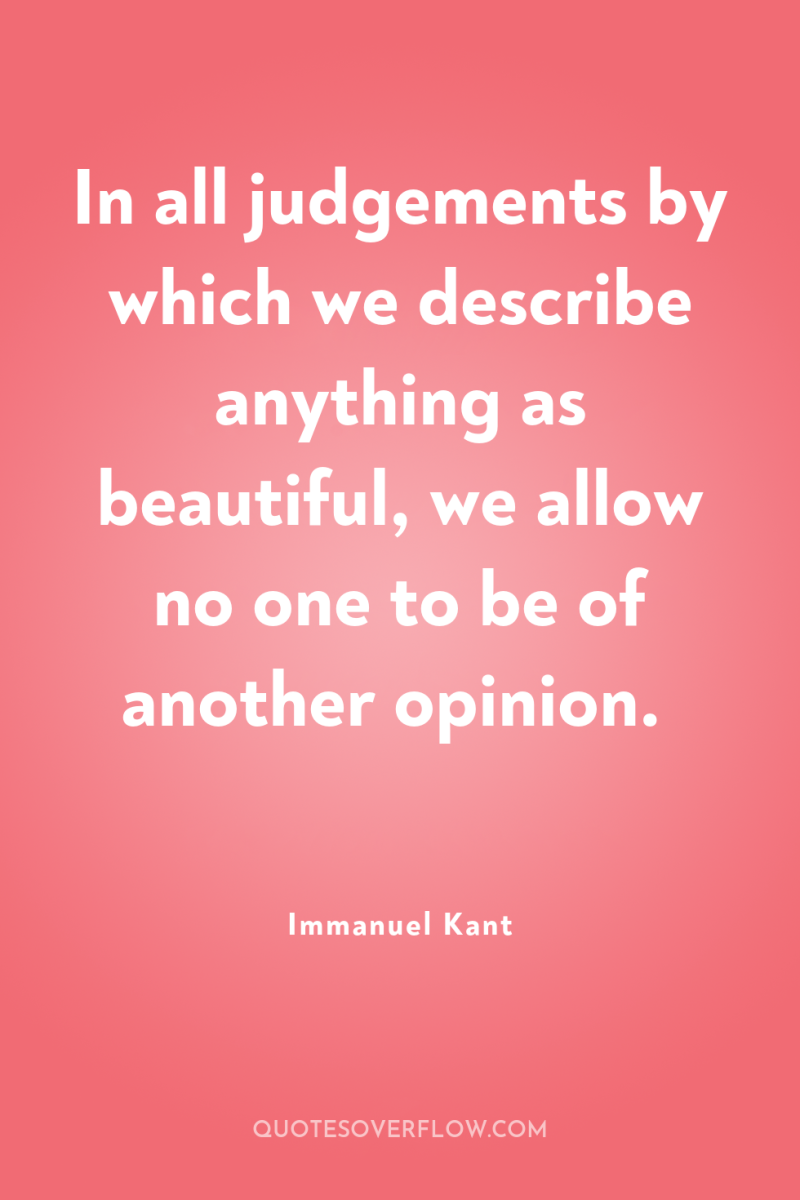
51
In all judgements by which we describe anything as beautiful, we allow no one to be of another opinion.Immanuel Kant
52
Act in such a way that you treat humanity, whether in your own person or in the person of any other, never merely as a means to an end, but always at the same time as an end.Immanuel Kant
53
Out of the crooked timber of humanity, no straight thing was ever made.Immanuel Kant
54
From the crooked timber of humanity, a straight board cannot be hewn.Immanuel Kant
55
Laziness and cowardice are the reasons why so great a portion of mankind, after nature has long since discharged them from external direction (naturaliter maiorennes), nevertheless remains under lifelong tutelage, and why it is so easy for others to set themselves up as their guardians. It is so easy not to be of age. If I have a book which understands for me, a pastor who has a conscience for me, a physician who decides my diet, and so forth, I need not trouble myself. I need not think, if I can only pay - others will easily undertake the irksome work for me. That the step to competence is held to be very dangerous by the far greater portion of mankind..Immanuel Kant
56
In the physical constitution of an organized being, that is, a being adapted suitably to the purposes of life, we assume it as a fundamental principle that no organ for any purpose will be found but what is also the fittest and best adapted for that purpose. Now in a being which has reason and a will, if the proper object of nature were its conservation, its welfare, in a word, its happiness, then nature would have hit upon a very bad arrangement in selecting the reason of the creature to carry out this purpose. For all the actions which the creature has to perform with a view to this purpose, and the whole rule of its conduct, would be far more surely prescribed to it by instinct, and that end would have been attained thereby much more certainly that it ever can be by reason. Should reason have been communicated to this favored creature over and above, it must only have served it to contemplate the happy constitution of its nature, to admire it, to congratulate itself thereon, and to feel thankful for it to the beneficent cause, but not that it should subject its desires to that weak and delusive guidance, and meddle bunglingly with the purpose of nature. In a word, nature would have taken care that reason should not break forth into practical exercise, nor have the presumption, with its weak insight, to think out for itself the plan of happiness and the means of attaining it. Nature would not only have taken on herself the choice of the ends but also of the means, and with wise foresight would have entrusted both to instinct.Immanuel Kant
57
...[N]ature generally in the distribution of her capacities has adapted the means to the end... [so nature's] true destination must be to produce a will, not merely good as a means to something else, but good in itself, for which reason was... imparted to us as a practical... absolutely necessary... faculty.Immanuel Kant
58
The touchstone of everything that can be concluded as a law for a people lies in the question whether the people could have imposed such a law on itself.Immanuel Kant
59
Give me matter, and I will construct a world out of it!Immanuel Kant
60
If adversity and hopeless grief have quite taken away the taste for life; if an unfortunate man, strong of soul and more indignant about his fate than despondent or dejected, wishes for death and yet preserves his life without loving it, not from inclination or fear but from duty, then his maxim has moral content.Immanuel Kant
61
Woman wants control, man self-control .Immanuel Kant
62
[A man] finds in himself a talent which with the help of some culture might make him a useful man in many respects. But he finds himself in comfortable circumstances and prefers to indulge in pleasure rather than to take pains in enlarging and improving his happy natural capacities. He asks, however, whether his maxim of neglect of his natural gifts, besides agreeing with his inclination to indulgence, agrees also with what is called duty. He sees then that a system of nature could indeed subsist with such a universal law, [where] men.. let their talents rest and resolve to devote their lives merely to idleness, amusement, and propagation of their species - in a word, to enjoyment; but he cannot possibly will that this should be a universal law of nature, or be implanted in us as such by a natural instinct. For, as a rational being, he necessarily wills that his faculties be developed, since they serve him, and have been given him, for all sorts of possible purposes.Immanuel Kant
63
I class the principle of moral feeling under that of happiness, because every empirical interest promises to contribute to our well-being by the agreeableness that a thing affords, whether profit be regarded.Immanuel Kant
64
A man reduced to despair by a series of misfortunes feels wearied of life, but is still so far in possession of his reason that he can ask himself whether it would not be contrary to his duty to himself to take his own life. Now he inquires whether the maxim of his action could become a universal law of nature. His maxim is: From self-love I adopt it as a principle to shorten my life when its longer duration is likely to bring more evil than satisfaction. It is asked then simply whether this principle founded on self-love can become a universal law of nature. Now we see at once that a system of nature of which it should be a law to destroy life by means of the very feeling whose special nature it is to impel to the improvement of life would contradict itself, and therefore could not exist as a system of nature; hence that maxim cannot possibly exist as a universal law of nature, and consequently would be wholly inconsistent with the supreme principle of all duty.Immanuel Kant
65
(On the seeming futility of metaphysics) Why then has nature afflicted our reason with the restless striving for such a path, as if it were one of reason's most important occupations? Still more, how little cause have we to place trust in our reason if in one of the most important parts of our desire for knowledge it does not merely forsake us but even entices us with delusions and in the end betrays us! Or if the path has merely eluded us so far, what indications may we use that might lead us to hope that in renewed attempts we will be luckier than those who have gone before us? .Immanuel Kant
66
We are not rich by what we possess but by what we can do without.Immanuel Kant
67
The schematicism by which our understanding deals with the phenomenal world ... is a skill so deeply hidden in the human soul that we shall hardly guess the secret trick that Nature here employs.Immanuel Kant
68
[At the beginning of modern science], a light dawned on all those who study nature. They comprehended that reason has insight only into what it itself produces according to its own design; that it must take the lead with principles for its judgments according to constant laws and compel nature to answer its questions, rather than letting nature guide its movements by keeping reason, as it were, in leading-strings; for otherwise accidental observations, made according to no previously designed plan, can never connect up into a necessary law, which is yet what reason seeks and requires. Reason, in order to be taught by nature, must approach nature with its principles in one hand, according to which alone the agreement among appearances can count as laws, and, in the other hand, the experiments thought in accordance with these principles - yet in order to be instructed by nature not like a pupil, who has recited to him whatever the teacher wants to say, but like an appointed judge who compels witnesses to answer the questions he puts to them. Thus even physics owes the advantageous revolution in its way of thinking to the inspiration that what reason would not be able to know of itself and has to learn from nature, it has to seek in the latter (though not merely ascribe to it) in accordance with what reason itself puts into nature. This is how natural science was first brought to the secure course of a science after groping about for so many centuries.Immanuel Kant
69
An action, to have moral worth, must be done from duty.Immanuel Kant
70
But although all our knowledge begins with experience, it does not follow that it arises from experience.Immanuel Kant
71
Experience without theory is blind, but theory without experience is mere intellectual play.Immanuel Kant
72
But, though all our knowledge begins with experience, it by no means follows that all arises out of experience.Immanuel Kant
73
He who is cruel to animals becomes hard also in his dealings with men. We can judge the heart of a man by his treatment of animals.Immanuel Kant
74
The people naturally adhere most to doctrines which demand the least self-exertion and the least use of their own reason, and which can best accommodate their duties to their inclinations.Immanuel Kant
75
...[T]o be unfaithful to my maxim of prudence may often be very advantageous to me, although to abide by it is certainly safer.Immanuel Kant
76
To behold virtue in her proper form is nothing else but to contemplate morality stripped of all admixture of sensible things and of every spurious ornament of reward or self-love. How much she then eclipses everything else that appears charming to the affections, every one may readily perceive with the least exertion of his reason, if it be not wholly spoiled for abstraction.Immanuel Kant
77
A good will is good not because of what it performs or effects, not by its aptness for the attainment of some proposed end, but simply by virtue of the volition - that is, it is good in itself, and considered by itself is to be esteemed much higher than all that can be brought about by it in favor of any inclination, nay, even of the sum-total of all inclinations.. like a jewel, it would still shine by its own light, as a thing which has its whole value in itself.Immanuel Kant
78
If we were to suppose that mankind never can or will be in a better condition, it seems impossible to justify by any kind of theodicy the mere fact that such a race of corrupt beings could have been created on earth at all.Immanuel Kant
79
Only the descent into the hell of self-knowledge can pave the way to godliness.Immanuel Kant
80
Whereas the beautiful is limited, the sublime is limitless, so that the mind in the presence of the sublime, attempting to imagine what it cannot, has pain in the failure but pleasure in contemplating the immensity of the attemptImmanuel Kant
81
...I am never to act otherwise than so that I could also will that my maxim should become universal law.Immanuel Kant
82
An age cannot bind itself and ordain to put the succeeding one into such a condition that it cannot extend its (at best very occasional) knowledge , purify itself of errors, and progress in general enlightenment. That would be a crime against human nature, the proper destination of which lies precisely in this progress and the descendants would be fully justified in rejecting those decrees as having been made in an unwarranted and malicious m .Immanuel Kant
83
Even if, by some especially unfortunate fate or by the niggardly provision of stepmotherly nature, [the good will] should be wholly lacking in the power to accomplish its purpose; if with the greatest effort it should yet achieve nothing, and only the good will should remain (not, to be sure, as a mere wish but as the summoning of all the means in our power), yet would it, like a jewel, still shine by its own light as something which has its full value in itself.Immanuel Kant
84
If now we attend to ourselves on occasion of any transgression of duty, we shall find that we in fact do not will that our maxim should be universal law, for that is impossible for us; on the contrary, we will that the opposite should remain a universal law, only we assume the liberty of making an exception in our own favor or (just for this time only) in favor of our inclination. Consequently, if we considered all cases from one and the same point of view, namely, that of reason, we should find a contradiction in our own will, namely, that a certain principle should be objectively necessary as a universal law, and yet subjectively should not be universal, but admit of exceptions. As, however, we at one moment regard our action from the point of view of a will wholly conformed to reason, and then again look at the same action from the point of view of a will affected by inclination, there is not really any contradiction, but an antagonism of inclination to the precept of reason, whereby the universality of the principle is changed into mere generality, so that the practical principle of reason shall meet the maxim half way. Now, although this cannot be justified in our own impartial judgement, yet it proves that we do really recognize the validity of the categorical imperative and (with all respect for it) only allow ourselves a few exceptions which we think unimportant and forced from us. .Immanuel Kant
85
An action done from duty has its moral worth, not in the purpose to be attained by it, but in the maxim according with which it is decided upon; it depends therefore, not on the realization of the object of action, but solely on the principle of volition in accordance with which, irrespective of all objects of the faculty of desire, the action has been performed.Immanuel Kant
86
Simply to acquiesce in skepticism can never suffice to overcome the restlessness of reason.Immanuel Kant
87
The will is conceived as a faculty of determining oneself to action in accordance with the conception of certain laws. And such a faculty can be found only in rational beings.Immanuel Kant
88
Even as to himself, a man cannot pretend to know what he is in himself from the knowledge he has by internal sensation. For as he does not as it were create himself, and does not come by the conception of himself a priori but empirically, it naturally follows that he can obtain his knowledge even of himself only by the inner sense, and consequently only through the appearances of his nature and the way in which his consciousness is affected. At the same time, beyond these characteristics of his own subject, made up of mere appearances, he must necessarily suppose something else as their basis, namely, his ego, whatever its characteristics in itself may be.. Now man really finds in himself a faculty by which he distinguishes himself from everything else, even from himself as affected by objects, and that is reason. This being pure spontaneity is even elevated above the understanding. For although the latter is a spontaneity and does not, like sense, merely contain intuitions that arise when we are affected by things (and are therefore passive), yet it cannot produce from its activity any other conceptions than those which merely serve to bring the intuitions of sense under rules, and thereby to unite them in one consciousness, and without this use of the sensibility it could not think at all; whereas, on the contrary, reason shows so pure a spontaneity in the case of what I call "ideas" [Ideal Conceptions] that it thereby far transcends everything that the sensibility can give it, and exhibits its most important function in distinguishing the world of sense from that of understanding, and thereby prescribing the limits of the understanding itself.Immanuel Kant
89
Metaphysics.. is nothing but the inventory of all we possess through pure reason, ordered systematically. Nothing here can escape us, because what reason brings forth entirely out of itself cannot be hidden, but is brought to light by reason itself as soon as reason's common principle has been discovered. The perfect unity of this kind of cognition, and the fact that it arises solely out of pure concepts without any influence that would extend or increase it from experience or even particular intuition, which would lead to a determinate experience, make this unconditioned completeness not only feasible but also necessary. Tecum habita, et noris quam sit tibi curta supellex. Dwell in your own house, and you will know how simple your possessions are. - Persius.Immanuel Kant
90
...Reason should take on anew the most difficult of all its tasks, namely, that of self-knowledge, and to institute a court of justice, by which reason may secure its rightful claims while dismissing all its groundless pretensions, and this not by mere decrees but according to its own eternal and unchangeable laws; and this court is none other than the critique of pure reason itself.Immanuel Kant
91
Enlightenment is man's emergence from his self-imposed immaturity. Nothing is required for this enlightenment except freedom; and the freedom in question is the least harmful of all, namely, the freedom to use with and publicly in all matters.Immanuel Kant
92
The whole interest of my reason, whether speculative or practical, is concentrated in the three following questions: What can I know? What should I do? What may I hope? (Critique of Pure ReasonImmanuel Kant
93
Would it not therefore be wiser in moral concerns to acquiesce in the judgement of common reason, or at most only to call in philosophy for the purpose of rendering the system of morals more complete and intelligible, and its rules more convenient for use (especially for disputation), but not so as to draw off the common understanding from its happy simplicity, or to bring it by means of philosophy into a new path of inquiry and instruction? .Immanuel Kant
94
Genius is the ability to independently arrive at and understand concepts that would normally have to be taught by another person.Immanuel Kant
95
The main point of enlightenment is man's release from his self-caused immaturity, primarily in matters of religion.Immanuel Kant
96
[To think for oneself] is the maxim of a reason never passive. The tendency to such passivity, and therefore to heteronomy of reason, is called prejudice; and the greatest prejudice of all is to represent nature as not subject to the rules that the understanding places at its basis by means of its own essential law, i.e. is superstition. Deliverance from superstition is called enlightenment; because although this name belongs to deliverance from prejudices in general, yet superstition especially (in sensu eminenti) deserves to be called a prejudice. For the blindness in which superstition places us, which it even imposes on us as an obligation, makes the need of being guided by others, and the consequent passive state of our reason, peculiarly noticeable.Immanuel Kant
97
Enlightenment is man's emergence from his self-imposed nonage. Nonage is the inability to use one's own understanding without another's guidance. This nonage is self-imposed if its cause lies not in lack of understanding but in indecision and lack of courage to use one's own mind without another's guidance. Dare to know! (Sapere aude.) "Have the courage to use your own understanding, " is therefore the motto of the enlightenment. .Immanuel Kant
98
...[W]e must admit that... law must be valid, not merely for men, but for all rational creatures generally, not merely under certain contingent conditions or with exceptions, but with absolute necessity...Immanuel Kant
99
Innocence is a splendid thing, only it has the misfortune not to keep very well and to be easily misled.Immanuel Kant
100
It is impossible to conceive anything at all in the world, or even out of it, which can be taken as good without qualification, except a good will.Immanuel Kant